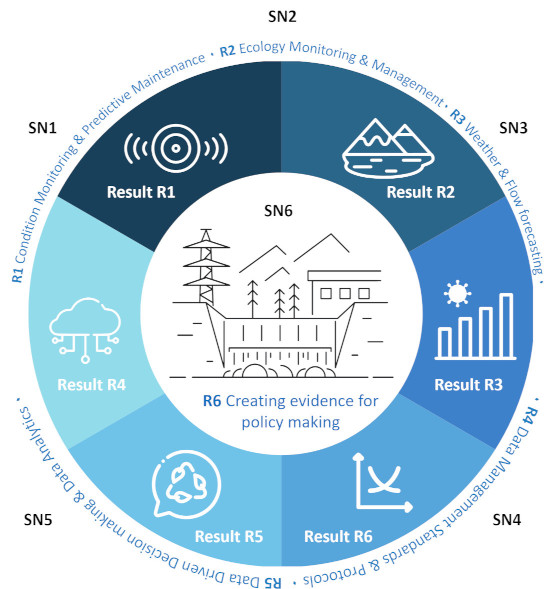Our approach
iAMP-Hydro has identified many challenges which must be overcome in order to enable the desired digital transition of existing hydropower plants.
These include specific needs (SN) and challenges on the lack of:
- SN1. Reliable and adaptable sensor technology and models for the prediction of operation and maintenance of hydromechanical and electrical equipment;
- SN2. Sensors and models for the assessment of the impact of plant operations on environmental, bio-diversity and socio-economic sustainability;
- SN3. Reliable weather and flow forecasting models for predicting water availability predictions, power production planning, and management of downstream flow impacts;
- SN4. Standardised secure data collection, communication and sharing protocols to enable trusted open and transparent digital optimization across multiple sensors, and interoperability between hydro operators and other renewable energy plants;
- SN5. Decision making algorithms which enable data-driven operation and maintenance to increase flexibility, optimize performance in energy markets and increase interoperability with other power sources; and
- SN6. Evidence for policymaking

In the iAMP-Hydro project, we work on the identified challenges in 11 different work packages, each one dealing with a specific challenge, and working in the consortium to find and realise the solution. Following, you can have a look at our approach:
Condition Monitoring for Hydropower Equipment
Predictive Maintenance Modelling for Hydropower
Ecology Monitoring Sensor Development, Data Analysis & Smart Flow Steering
Flow and available power prediction model development & forecasting
Semantic Interoperability Mechanisms for Hydropower, Energy and Other Relevant Data
End-User Requirements and Architecture Design for the ICT Components of iAMP-Hydro & iAMP-Hydro Platform Implementation
Data Analytics and Hydro Asset Management Platform Development
System Validation in Operating Hydro plants & Case studies

